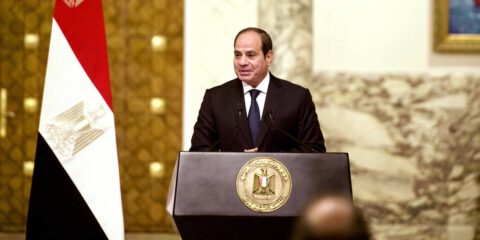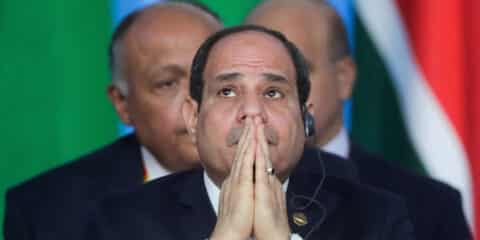Egypt continues to play an active role in regional affairs, including the Aqaba emergency meeting on the Palestinian situation (February 26) and the ongoing effort to prevent escalation in Gaza. At the same time, Cairo is in the middle of a significant financial crisis. The effects of the war in Ukraine – specifically, grain shortages – brought the Egyptian pound to more than 30 to the dollar, up from 20 in November and 15 in early 2022, facilitated by deliberate government action in response to demands by the IMF. Inflation still soars, and so does youth unemployment. All this could destabilize a nation of 105 million on our border, with dire consequences.
The regime has taken austerity measures to restrain expenditures in foreign currency and moved for the first time to privatize segments of the military-owned sector – a considerable part of the Egyptian economy. It also seeks to reduce the debt-to-GDP ratio. Meanwhile, major construction plans are still under way, backed by hopes generated by gas findings. Israel’s direct role is limited to the gas sector, hence the need to encourage our vital interlocutors in the Gulf to help stabilize the economy through investments in industry and infrastructure. Jerusalem also needs to raise – during its strategic dialogue with the US and Europe – the need to back the reforms, and to bear in mind, given what is at stake, the utility of the Chinese role in enabling Sisi’s vision of “Egypt 2030.”
The ailing Egyptian Economy
Egypt’s economic woes were made manifest early in 2023 when the Egyptian pound rapidly collapsed, crossing for the first time the threshold of 30 to the dollar (25 in December 2022, less than 20 in October). The key reason was the foreign currency shortage due to the steep rise in the cost of wheat and other essential import products, as the war in Ukraine disrupted supply lines. Record users’ fees from the Suez Canal – the enlargement of which had been one of Sisi’s proudest grand projects – could only marginally cover these shortfalls. All of it was compounded by the lingering effects of a decline in state incomes in recent years, including a decrease in tourism, the impact of COVID, terror attacks, and broader patterns in the global markets all at play.
The pound’s collapse is also due to deliberate regime policy derived from the commitments made in the framework of the agreement with the IMF, approved in December 2022. It would entitle Egypt to $3 billion in loans over the next three years under an EEF – Extended Fund facility – to be disbursed in batches of a few hundred million every few months, subject to a twice-yearly review of Egypt’s compliance with the IMF’s conditions. The latter include, among others, the floating of the Egyptian pound, a restrictive monetary policy aimed at curbing inflation, budget cuts aimed at reducing the debt-GDP ratio (now at 88%), and generating growth centers led by the private sector.
Among the immediate and demonstrative steps of the regime came the declaration by Prime Minister Mostafa Madbouly (January 9, 2023) that until the end of the Egyptian fiscal year (in June), there will be severe restrictions on all government foreign currency expenditures, including travel abroad, and acquisitions in most government ministries excluding the ministries of Defense, Foreign Affairs, Interior and Health (a list indicating what the core capacities of the state are now). All actions over the limits would need authorization at the highest level. None of this would pull Egypt out of its difficulties, but they were meant as a message – proof of the regime’s recognition of the seriousness of its predicament – aimed at both the IMF and the Egyptian public.
At this stage, there are no signs that the steps taken by the government – having been modified by gestures toward the poorer classes, such as the distribution of pita bread and other essentials – gave rise to any significant political disturbances. However, if the economic decline continues, it is difficult to predict when the turning point might come. For Israel, there are strategic reasons for trying to prevent developments that could lead to instability in the most important country on our border.
Positive Trends on the Horizon
Given the Fund’s consistent commitment to promoting free markets, one set of actions derived from the IMF demands is reflected in the Egyptian government’s decision to privatize state assets, specifically those owned by the military. For the first time, it may become possible to open to investment, and competition, sectors that for decades have been under the control of the military establishment and constituted about a third of the national economy. Beyond the income from privatization, this can also help correct structural impediments that have long burdened Egypt’s growth. The IMF has suggested a 14 billion pound benchmark for private investment to be drawn by these measures in the three years under review.
Another potential ray of light – alongside the prospects of a pick-up in tourism in the post-pandemic era and as terrorism subsides (although regime claims of victory seem premature) comes from the energy field, specifically the series of discoveries in Egyptian EEZ waters. The announcement (January 15, 2023) that gas was discovered by a partnership of ENI and Chevron at the Narjes off-shore field can be added to previous breakthroughs offering a prospect of economic relief – if indeed arrangements are made in the Eastern Mediterranean basin enabling cooperation in exports. Still, gas exports will only impact the economy and the balance of payments a few years down the road.
How Can Israel be of Help?
As noted above, the continued stability of the political order in Egypt is among Israel’s most important national interests, if only because the alternative – the collapse of governance in a nation of 105 million on our border and possibly a full or partial takeover by radical totalitarian Islamists in Sinai and/or Egypt – would itself constitute a grave danger to Israel’s national security.
Moreover, Sisi’s regime – despite points of friction from time to time – has positioned itself as a constructive actor toward Arab-Israeli normalization, joining the Negev Forum (alongside the US, Israel, the UAE, Bahrain, and Morocco) and serving through its intelligence service as an effective go-between with Hamas on a range of issues, including the fate of Israelis and bodies held in Gaza. Egypt played a role in the Aqaba emergency meeting and will host the next round. While it is true that Cairo’s position on the Palestinian question remains unchanged, and its posture toward Israel in UN institutions remains quite hostile, cooperation in other aspects of the relationship, including the war on terror in Sinai, is closer than ever. The regime now claims to have achieved a decisive outcome in the struggle against the “Sinai Province” of ISIL – and to some extent, as it is willing to admit in private, with Israel’s help.
On the economy, however, Israel’s direct leverages are pretty limited:
- Supply of gas from Israeli fields, which enables Egypt to export LNG from its existing facilities (which have been idle for a long while) on the Mediterranean coast.
- The QIZ arrangements, which enable Egyptian produce to be sold to the US under the terms of the American-Israeli FTA as long as a certain percentage of Israeli input is involved.
More significantly, the Israeli government can and should use the range of diplomatic avenues available – including the EMGF (East Mediterranean Gas Forum) and the Negev Forum, as well as bilateral strategic consultations with the US and European powers – to support policies that can help Egypt extricate itself from its present predicament:
- Seek an agreed resolution – in close coordination with Greece – of the EEZ delineation in the Eastern Mediterranean, currently challenged by Turkey. There is room for compromise, drawing on the Israeli-Lebanese model, particularly if there indeed seems to be a willingness in Libya to renegotiate the November 2019 MoU with Ankara.
- Encourage the Gulf states, led by the UAE (and Saudi Arabia), to realize the potential for investment mapped out by the IMF – and invest in significant productive sectors of the Egyptian economy, including military-owned enterprises that may now be on sale.
- Turn the attention of national security establishments in friendly countries – above all, the US and Europe – to the need to give the necessary backing for Sisi’s reforms and treat the role played by the PRC in Egyptian projects leniently. Too much is at stake for this to become another point of contention regarding Chinese influence.
There are and will be ways for the Egyptian regime to be made aware of such discreet Israeli actions, which reflect Jerusalem’s national security interests rather than an act of altruism. Nevertheless, Israel can contribute to consolidating bilateral relations and bolstering Egypt’s commitment to the 1979 Peace Treaty.
JISS Policy Papers are published through the generosity of the Greg Rosshandler Family.
Photo: IMAGO / APAimages








 - בניית אתרים
- בניית אתרים